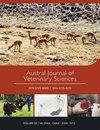墨西哥维吉尼亚州自由放养Didelphis种群的血液学参数
IF 0.8
4区 农林科学
Q3 VETERINARY SCIENCES
引用次数: 4
摘要
美国负鼠(Didelphis virginia)是北美地理分布最广的有袋类动物,是非常重要的自然宿主,是维持和传播许多对公共卫生具有重要意义的人畜共患病微生物的关键,也是对人类环境适应性最强的野生哺乳动物之一,但尽管如此,人们对其自由放养种群的一些生理方面知之甚少。在本研究中,首先描述了来自尤卡坦州农村地区弗吉尼亚负鼠共生性种群的201只负鼠的基本血液学参数。血红蛋白、堆积细胞体积、红细胞和嗜酸性粒细胞的平均值,雄性和成年负鼠(除嗜酸性粒细胞外)分别高于雌性和幼年负鼠,而幼年负鼠的淋巴细胞、中性粒细胞和血小板的平均值高于雄性。未怀孕女性的平均红细胞体积、淋巴细胞和血小板显著高于怀孕女性,红细胞计数和节段中性粒细胞显著高于怀孕女性。建立自由放养种群的基本血液学参数,为种群健康监测和进一步研究尤卡坦半岛某些人畜共患病原体的宿主-寄生虫关系提供了有益的参考。本文章由计算机程序翻译,如有差异,请以英文原文为准。
Haematological parameters in a free-ranging population of Didelphis virginiana from Mexico
The American opossum Didelphis virginiana is the marsupial species with the largest geographic distribution in North America, a very important natural host and key to the maintenance and transmission of many zoonotic pathogenic microorganisms of importance in public health, and one of the wild mammals with the greatest adaptation to the human environment, but despite all that very little is known about some physiological aspects in their free-ranging populations. In the present study, basic haematological parameters of 201 opossums from a synanthropic population of D. virginiana in a rural locality of the state of Yucatan, are first described. The average values of haemoglobin, packed cell volume, red blood cells, and eosinophils were higher in males and adults (except eosinophils) than in females and juveniles, respectively, and juvenile opossums had higher values of lymphocytes, neutrophils, and platelets than males. Non-pregnant females had significantly higher values of mean corpuscular volume, lymphocytes and platelets than pregnant ones, while red blood cell count and segmented neutrophils showed higher values in pregnant females. The establishment of the basic haematological parameters for free-ranging populations of D. virginiana is a very useful reference for both the health monitoring of the populations and further studying the host-parasite relationship of some zoonotic pathogens present in the Yucatan Peninsula.
求助全文
通过发布文献求助,成功后即可免费获取论文全文。
去求助
来源期刊

Austral Journal of Veterinary Sciences
Veterinary-General Veterinary
CiteScore
1.60
自引率
0.00%
发文量
18
期刊介绍:
Austral Journal of Veterinary Sciences (formerly Archivos de Medicina Veterinaria) publishes original scientific contributions in English, containing the latest developments and discoveries in veterinary sciences. The journal covers topics such as animal health and production, preventive medicine, zoonosis, pharmacology and therapeutics, methods of diagnosis, and other areas related to the veterinary field.
Austral Journal of Veterinary Sciences aims to divulge information about advances in veterinary medicine among universities, research centres, industries, government agencies, biologists, agronomists and veterinarians.
 求助内容:
求助内容: 应助结果提醒方式:
应助结果提醒方式:


